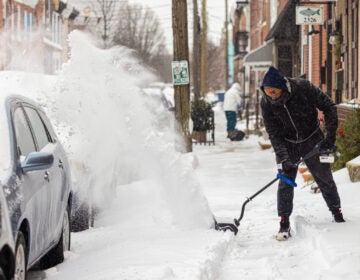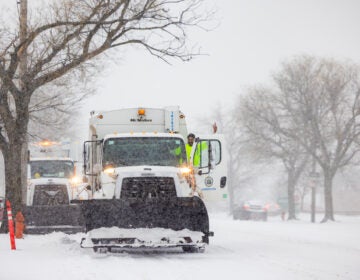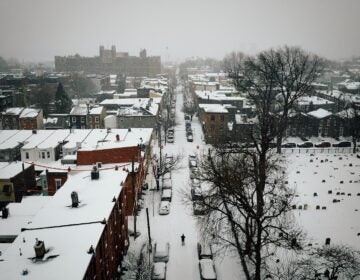Pew survey shows low marks for Nutter, Philly Council
If Philadelphia Mayor Michael Nutter had a regular, non-elected job, he might be wise to start looking for a new one.
His job performance ratings are the lowest that the Pew Charitable Trusts has seen in the last five years of its surveys, according to poll results released Wednesday.
Fifty-two percent of respondents said they disapproved of Nutter’s job performance, while only 39 percent gave him a thumbs-up. Compare that with January 2012, when 60 percent of Philadelphians said Nutter was doing a good job, and 30 percent said he wasn’t.
Larry Eichel, a director of Pew’s Philadelphia program, noted that when Pew conducted the survey, from July 23 to Aug. 13, the news was saturated with stories about the school district’s budget woes and the aftermath of the fatal building collapse on Market Street in Center City.
On Aug. 8, schools Superintendent William Hite threatened to delay the start of classes if the district did not quickly receive promises from the city that an additional $50 million was on the way. Nutter and City Council vowed to pony up, and schools opened on time.
“We don’t specifically ask why [respondents] give us the answers they do,” said Eichel, “but I think it’s pretty clear that the education situation is a huge concern.”
City Council’s job approval rating also dipped this year, though not as drastically as Nutter’s. Only 30 percent of respondents approved of the lawmakers’ performance, compared with 35 percent in 2012.
Philadelphians have a less rosy opinion about the city itself, too. Of the 1,605 residents polled, 45 percent said Philly is on the wrong track, while 37 percent said it is moving in the right direction. Though that isn’t much of a difference compared with last year, it is a complete reversal from 2009. In that year, 37 percent saw the city as moving in the wrong direction, and 46 percent said the opposite.
Compared with 2009, fewer respondents said they thought the city would improve in the next five years, and more said Philly had become a worse place to reside in the last five years.
Most respondents like living in Philly
The poll’s findings weren’t all gloomy, though. Three-fifths of residents said Philly is a good or excellent place to call home, which is more or less the same as in past years.
While that might seem to contradict the survey’s other results, Eichel said, it’s really not.
“It’s just saying, ‘I’m upset with the way things are going now, but I really love Philadelphia.’ You can have both of those attitudes at the same time,” he said.
Last week, Pew released the first round of results from this survey, which showed that 52 percent of respondents graded the Philadelphia School District “poor.” Residents were asked about the public school system before they were quizzed about Nutter. Eichel said he did not believe this ordering skewed the results.
“The schools were a huge issue in the news and in the atmosphere at the time of this poll, and they were there whether we mentioned them or not,” he said. “The overall downwards trends on everything, which we see reflected in the ratings of the mayor, were there in the very first three or four questions we asked before we got into anything more specific.”
Longtime pollster Cliff Zukin, a Rutgers University professor of public policy and political science, developed and conducted the poll with Abt SRBI Public Affairs. The survey has a margin of error of roughly plus or minus 2.5 percentage points.
‘There aren’t many surprises’
Asked about the survey, spokesman Mark McDonald said Nutter strongly believes that the findings concerning the city’s future are a reaction to the school district’s ongoing fiscal crisis.
“While the city has experienced a decline in violent crime and we’re seeing plenty of evidence that the economy is beginning to grow, the public schools are the issue in the forefront of Philadelphians’ concerns,” he said.
That’s why Nutter is pushing for the state to provide “sustainable” funding to the schools, and to authorize a new, local cigarette tax for their benefit, said McDonald. He also noted that the city government has boosted annual aid to the school district by $155 million since mid-2010.
Council President Darrell Clarke’s spokeswoman, Jane Roh, said, “There aren’t many surprises in this poll. The Market Street collapse is one of the worst things to happen in the city in recent memory. And the Commonwealth of Pennsylvania’s refusal to adequately fund one of the largest public school districts in the nation is an outrage and a national embarrassment.”
Roh noted that Council is also lobbying Harrisburg for “sustainable and reliable” funding for the city’s schools, as well as planning to release recommendations Thursday stemming from a special investigative committee that was created in response to June’s deadly building collapse.
A previous version of this story noted that Nutter’s office had not responded to a request for comment. This post has been updated to reflect the statement that was provided to WHYY/NewsWorks.org following its publication.
WHYY is your source for fact-based, in-depth journalism and information. As a nonprofit organization, we rely on financial support from readers like you. Please give today.




